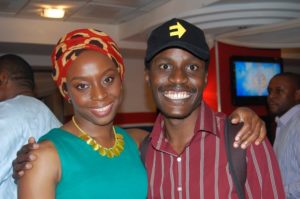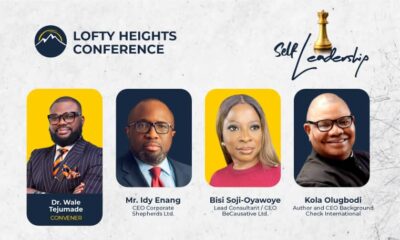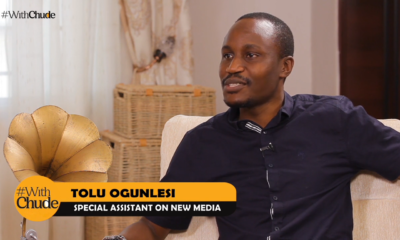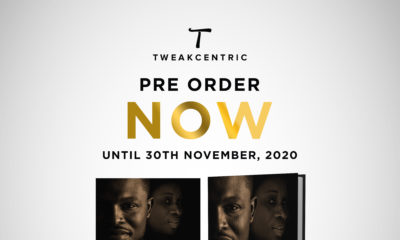News
“I buy books the way our politicians steal money – as if there’ll be no tomorrow.” – Tolu Ogunlesi, Award Winning Poet, Journalist and Fiction Writer
 He was born in 1982. He is the author of a collection of poetry, ‘Listen to the Geckos Singing from a Balcony’ (Bewrite Books, 2004) and a novella, ‘Conquest & Conviviality’ (Hodder Murray, 2008). In 2007 he was awarded a Dorothy Sargent Rosenberg poetry prize, in 2008 the Nordic Africa Institute Guest Writer Fellowship, and in 2009 a Cadbury Visiting Fellowship by the University of Birmingham. He went on to win the Arts & Culture Award at the CNN African Journalist of the Year Awards 2009 for his story, ‘What the Truck?’, which was chosen from among 836 entries from 38 nations across the African continent. His fiction and poetry have been published in The London Magazine, Wasafiri, Farafina, PEN Anthology of New Nigerian Writing, Litro, Brand, Orbis, Nano2ales, Stimulus Respond, Sable, Magma, Stanford’s Black Arts Quarterly and World Literature Today, among others. His works have also been published online by 3 Quarks Daily, Eclectica, Buran, The Vocabula Review, Crossing Borders, Banyan Review, Stickman Review, Hiss Quarterly, Underground Voices, Pindeldyboz, African Writing, Sentinel poetry, The Maynard, Hackwriters. He is currently enrolled in an MA Creative Writing programme at the prestigious University of East Anglia in England. In this exclusive interview with BN Editorial Assistant, Gbenga Awomodu, Tolu Ogunlesi puts his wits on as he talks about childhood dreams, writing, journalism, publishing, Nigeria and other interesting details.
He was born in 1982. He is the author of a collection of poetry, ‘Listen to the Geckos Singing from a Balcony’ (Bewrite Books, 2004) and a novella, ‘Conquest & Conviviality’ (Hodder Murray, 2008). In 2007 he was awarded a Dorothy Sargent Rosenberg poetry prize, in 2008 the Nordic Africa Institute Guest Writer Fellowship, and in 2009 a Cadbury Visiting Fellowship by the University of Birmingham. He went on to win the Arts & Culture Award at the CNN African Journalist of the Year Awards 2009 for his story, ‘What the Truck?’, which was chosen from among 836 entries from 38 nations across the African continent. His fiction and poetry have been published in The London Magazine, Wasafiri, Farafina, PEN Anthology of New Nigerian Writing, Litro, Brand, Orbis, Nano2ales, Stimulus Respond, Sable, Magma, Stanford’s Black Arts Quarterly and World Literature Today, among others. His works have also been published online by 3 Quarks Daily, Eclectica, Buran, The Vocabula Review, Crossing Borders, Banyan Review, Stickman Review, Hiss Quarterly, Underground Voices, Pindeldyboz, African Writing, Sentinel poetry, The Maynard, Hackwriters. He is currently enrolled in an MA Creative Writing programme at the prestigious University of East Anglia in England. In this exclusive interview with BN Editorial Assistant, Gbenga Awomodu, Tolu Ogunlesi puts his wits on as he talks about childhood dreams, writing, journalism, publishing, Nigeria and other interesting details.
Could you share a bit about your family background and experience growing up?
I spent the first one-and-half years of my life in the UK; and the next 27 years in Nigeria – Abeokuta, Ibadan and Lagos. Growing up we were what I guess you’d call ‘middle class’, even though the definition of that kept becoming hazier as time – and Messrs Babangida and Abacha – went on. I grew up in a house in which we spoke –and still speak – Yoruba, and encountered English only in books and on television. I grew up with a lot of toys which fired my imagination in incredible ways – coloured plastic letters of the alphabet became useful in playing a ‘war and peacekeeping game’ in which the Allied Forces endlessly battled the Soviets (upturned letters forming the casualties). Spending 21 years living almost exclusively in small towns/cities has made me a small-town boy. I’ve lived in Lagos for about five years, but consider myself a pilgrim there: the love of money is the root of moving to Lagos.
What were your childhood dreams and aspirations?
I can’t remember most of them. I remember wanting to inherit my father’s Volvo though. And the red Swiss Army knife in the glove compartment. And maybe I wanted to be a medical doctor. And of course I must have wanted to grow up quickly.
You have been widely acclaimed a prolific writer even in the international press. When did you start writing poems and stories?
I have been writing since I was a child; an adventure novel completed when I was twelve is a testament to that. But serious writing didn’t start until around 2001, about midway into my University degree; poetry at first, then fiction a few years later, then journalism afterwards.
Which writers have influenced your writing over the years?
Far too many to list! Every writer I have read has influenced me in one way or the other. Perhaps that’s because, apart from reading for pleasure, I also read to be influenced, to learn a thing or two about writing, about expressing myself.
Have you ever been discriminated against as a Pharmacist in the literary or journalistic world?
Not really. But I have had a couple of internet commentators suggest, for various reasons, that I’m not a journalist. My answer to them: Fine. Keep the title; just leave me with the work.
 You have your name stamped almost ‘everywhere’ on the internet; how have you been able to achieve this enviable feat in less than a decade? What habits have you imbibed to help you?
You have your name stamped almost ‘everywhere’ on the internet; how have you been able to achieve this enviable feat in less than a decade? What habits have you imbibed to help you?
You have to thank Google for that ‘stamping’. If there were no search engines you wouldn’t be asking this question. I do what I do – which is to write, and publish what I’ve written. Google stalks me and ensures that much of what I write can be found very easily on the internet. It’s a partnership that has worked very well thus far.
You have been described as a workaholic by not a few; even Olu Jacob, the Standard Editor at 234Next attests to that. What drives you?
Workaholic. That’s an interesting description. There are not that many things that I do very well. So it makes sense to spend most of my time focused on the one that I think I do well, and enjoy doing. If I thought I could act, or sing – half the time I’d be attending reality show auditions in Lagos. Sometimes being multi-talented is not a blessing.
How and from where do you draw inspiration as a writer?
From everything around me, from what I read, what I see on television, what I overhear from conversations in public… there’s nothing that cannot be imaginatively converted into inspiration.
Have you ever experienced the writer’s block? How do you handle it?
Writers’ block is part of my life. I sometimes handle it by running away from it – to Facebook and Twitter. The other way to handle it is to have a deadline looming. Then I have no choice, I sit, and I write, in spite of the feeling of being blocked. Deadlines for me constitute an excellent anti-block therapy.
Did you have any problems with your parents when you decided not to practice Pharmacy but do writing and journalism?
No. I didn’t wake up one day and say: “from now on, my life has changed. Goodbye to Pharmacy!” Long after I started writing I was still working at normal jobs. I didn’t become a full-time journalist until a little over a year ago. The best way to let people allow you do what you want to do is to prove to them that you can make something out of it. And sometimes that proving takes time, so it makes sense to be cautious about making sudden plunges.
Besides, I’m still a pharmacist – I went to school for five years – six, courtesy of ASUU – to earn that degree. I won’t allow anybody to take that away.
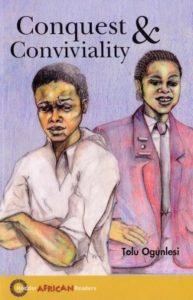 How many books do you have in your personal library and how many have you read in the last two years?
How many books do you have in your personal library and how many have you read in the last two years?
I buy books the way our politicians steal money – as if there’ll be no tomorrow. I derive a certain pleasure from flipping through a book, reading the blurb and author’s bio and short extracts, convincing myself that I ought to own it, and then adding it to my collection. I also reckon it’s not a bad idea to give books the chance to keep one another company, while waiting – sometime in vain – for their master’s attention. I don’t know how many books I own (they are scattered in at least three cities). But I know that I have not yet got round to reading more than a handful of them.
What other activities do you take part in aside writing and reading?
Talking (gisting with friends), dancing, playing football, daydreaming, cursing Nigerian politicians, cursing Nigerian politicians again, Facebooking, Tweeting, making friends. Occasionally, I try to think.
Your writings and commentaries on national issues in your Ongoing Concerns column for 234Next never lack sharp wit and mostly leave readers refreshed and entertained. How do you add this extra spice to your writings? Have you thought of compiling them into a book in the near future?
I think it’s too early to start thinking of putting out a compilation of my opinion pieces. For now I’m content to just keep writing them, week after week. Someday I will think of a book. Regarding the humour or wit, let me quote Chinese artist Ai Weiwei. He recently told the Financial Times that “humour is a necessary ingredient when you’re living under an authoritarian society”. If you think that because the military are back in the barracks Nigeria is no more an authoritarian society, you’re sadly mistaken. We have exchanged military tyranny for civilian one – Big Men and Women who wake up with nothing else on their minds than how to oppress everyone else, and even poor men and women who will not waste any opportunity to oppress whoever they can. There are many oppressions in Nigeria – the perpetual darkness of NEPA, the mocking hiss of water taps when you turn them on, police checkpoints, having the level of respect accorded to you wholly dependent on what car you drive or what phone you use, etc. So humour comes in handy, makes a great seasoning for anger.
Your work as a journalist has seen you writing to condemn questionable acts of some political bigwigs. Have you ever received threats about your articles?
Threats? Actually, no. I imagine those politicians just laugh and recite proverbs that include the words “ranting” and “ant”. I’m not under the illusion that they care much. There’s so much stupid leadership to be exhibited and demonstrated that there’s little time to be bothered that someone is writing satirical articles about you. Plus, in today’s Nigeria, it seems the Big Men have realized that harassing journalists into silence is so old school – why not ‘feed’ them into stupor instead. Or start your own newspapers to tell your own story. The warnings I receive are typically from well-meaning readers who tell me to “be careful o!”
What is your take on Nigeria at the moment and the role of journalists and writers in helping to effect the change we desire in our nation?
My theory is that, in a country like Nigeria where people doing shameful things typically feel no sense of shame, journalists have a duty to ensure that shame does not suffer the kind of devaluation that the naira has suffered. ‘Speaking truth to power’ is how a wise man, or woman, has described it. It is not a choice, it is a duty. And of course there are also the traditional duties of journalism – to inform, educate, and entertain.
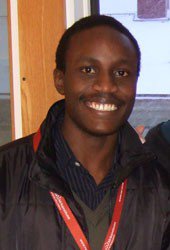 Could you shed more light on your MA programme at the University of East Anglia? What plans do you have for the future, especially after the postgraduate degree?
Could you shed more light on your MA programme at the University of East Anglia? What plans do you have for the future, especially after the postgraduate degree?
The MA Creative Writing programme at UEA is the oldest creative writing course in the UK, and arguably the most well known. I’m in the 40th set; in the first set (1971) was Ian McEwan, who is today one of Britain’s best-known novelists. After this degree, life will have to continue. That means full-time journalism again.
There has been an upsurge in the number of young writers emerging from Nigeria side-by-side with a publishing industry that is sadly not big enough to accommodate them. What are your views on publishing in Nigeria?
There is very little publishing going on in Nigeria. Very little, if you take our population and the vibrancy of the literary community into account. But there is certainly a great deal of printing going on. That in itself is not a bad thing, but we need to match that printing with an entire structure of editors, marketing personnel, bookstores, literary magazines, book reviewers, distribution systems, writing workshops, writing grants and scholarships, etc. Only then can we boast of having a publishing industry.
Kudos to publishers like Kachifo and Cassava Republic for keeping the publishing dream alive, for serving as beacons of hope in what is essentially a wilderness.
You have published at least two books, but not in Nigeria. How do you plan to make your books accessible to readers here in Nigeria?
For several years I’ve been saying I’d have a Nigerian edition of my poetry collection, ‘Listen to the Geckos Singing from a Balcony’ (Bewrite Books), published. Clearly I haven’t been very serious about that. However, my young adult novella, ‘Conquest and Conviviality’ (Hodder UK), will be widely available in Nigeria in 2011.
What is the relevance of awards and writing prizes? Does the fact that I have not won awards mean I am not good enough a writer?
Awards have little to do with how good or not you are as a writer. They can be incredibly validating of course, and financially rewarding, and often bring you a larger audience and more attention from the public – and for these we should be grateful – but we must never forget that awards are the subjective decisions of individuals and committees, and that the competitive element means that there will be many ‘losers’ for every ‘winner’. Not everyone can win an award, and winning one doesn’t automatically make you a better writer than non-winners.
What piece of advice do you have for young writers who keep complaining about limitations in getting their works published?
Keep writing, keep contacting editors, keep submitting your work, and keep trying to improve your writing. That’s all that we can continue to do. The rest – like luck – is not in our hands. There is no amount of luck or good fortune that can get a blank manuscript published, is there?
In what ways do you mentor new/young writers?
By working hard at my writing, and continuing to do it, when I probably could be making more money doing other things. The best mentoring is in showing what can be done, igniting a sense of possibility. “Yes I am!…” is my loudest “Yes you can!” Occasionally, I try to critique work by fellow writers, but I’ve not been very successful at doing that – my email is full of manuscripts awaiting my attention.
You seem to be well engrossed in a lot of work at the moment. Any plans to get married soon?
Depends on what you mean by soon? Two weeks – or two years? I’m not in a hurry, and find myself unfortunately unable to consider marriage something you do simply because you think the time for it has come – like, say, lunchtime.
How do you relax after work?
Now that’s a difficult question to answer. Maybe because I see all my relaxation as in-between work, not after it. My work is never finished – emails to answer, deadlines to meet, stuff to be read, groundbreaking philosophical discoveries to be shared on Facebook and Twitter… So, on the rare occasion that I relax – I travel, I wander around bookstores, I go dancing (preferably to Nigerian hip-hop), I meet up with friends to eat, drink and talk. I recently bought a bicycle, and have plans to learn swimming.
___________________________________________________________________________________________
Gbenga Awomodu is a freelance writer and editor. He blogs at Gbenga’s Notebook!, a repository of his thoughts and other works.

